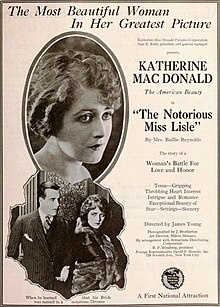Gertrude Minnie Robins



Gertrude Minnie Robins (11 July 1861 — 22 November 1939) was an English writer, author of over fifty novels, many of them under her married name, Mrs. Baillie Reynolds.
Early life[edit]
Gertrude Minnie Robins was born in Teddington, the daughter of Julian Robins.[1] Her father was a barrister. She attended South Hampstead High School.[2]
Career[edit]
Robins published her first novel, Keep My Secret, in 1886.[3] She would go on to write over fifty novels and story collections,[4] mostly in the crime, mystery, or gothic genres, including A False Position (1887), The Tree of Knowledge (1889), The Ides of March (1892), In the Balance (1893), To Set Her Free (1895), Her Point of View (1896), The Silence is Broken (1897), Nigel Ferrard (1899), The Professional and Other Psychic Stories (1900), The Relations and What They Related (1902), Phoebe in Fetters (1904), The Man Who Won (1905), A Dull Girl's Destiny (1907), Broken Off (1908), Thalassa! (1908), The Supreme Test (1908), Makeshifts & Realities (1908, short plays), The Girl from Nowhere (1910), Out of the Night (1910), Nigel Ferrard (1911), The Notorious Miss Lisle (1911), A Makeshift Marriage (1912), A Doubtful Character (1914), The Daughter Pays (1916), A Castle to Let (1917), Open Sesame! (1918), The King's Widow (1919), Also Ran (1920), The Judgment of Charis (1922), The Lost Discovery (1923), The Spell of Sarnia (1925), The Innocent Accomplice (1928), Whereabouts Unknown (1931), The Missing Two (1932), The Terrible Baron and Other Stories (1933), Very Private Secretary (1933), The Intrusive Tourist (1935), Trouble at Glaye (1936), and It Is Not Safe to Know (1939).[5] "Mrs. Baillie Reynolds has a knack for creating diverting situations and for finding odd and unusual places in which to develop them," noted a reviewer in 1918.[6]
Robins was active in the woman's suffrage movement, and was president of the Society of Women Journalists in 1913.[4][7] Four of her books were adapted for silent films: The Man Who Won (1918), Notorious Miss Lisle (1920), The Daughter Pays (1920), and Confessions (1925).
Personal life[edit]
Gertrude Minnie Robins married a stockbroker, Louis Baillie Reynolds,[8][9] in 1890. They had three sons, Eustace (1893-1948), Paul Kenneth (1896-1973),[10] and Donald Hugh (1900-1991). She died in 1939, in St. Albans.[11]
References[edit]
- ^ The Monthly (alphabetical) record of births, deaths, & marriages (1861): 446.
- ^ Who's who: An Annual Biographical Dictionary (1907): 1475.
- ^ "The Bookman Gallery: Mrs. Baillie Reynolds" The Bookman (September 1907): 190.
- ^ a b "Mrs. Baillie Reynolds; Gertrude M. Robins" in Sandra Kemp, Charlotte Mitchell, and David Trotter, eds., Oxford Companion to Edwardian Fiction (Oxford University Press 2005). ISBN 9780191727382
- ^ "The Online Books Page of Mrs. Baillie Reynolds" Online Books Page, John Mark Ockerbloom ed.
- ^ "The Lonely Stronghold" Book News Monthly (July 1918): 418.
- ^ "Woman Novelist Dead" Newcastle Morning Herald and Miner's Advocate (23 November 1939): 10. via Trove

- ^ "Historic Overview Louis Baillie Reynolds". CyclingRanking.com.
- ^ "Louis Baillie Reynolds". FamilySearch.
- ^ "Paul Kenneth Baillie Reynolds (1896-1973)" The Monuments Men (Monuments Men Foundation).
- ^ "Novelist's Death" The Argus (23 November 1939): 3. via Trove

External links[edit]
- Works by Gertrude Minnie Robins at Project Gutenberg
- Troy J. Bassett, "Author Information: Gertrude Minnie Robins" At the Circulating Library: A Database of Victorian Fiction, 1837-1901.
- 1861 births
- 1939 deaths
- British suffragists
- 19th-century British women writers
- 20th-century British women writers
- 19th-century British novelists
- 20th-century British novelists
- 19th-century British short story writers
- 20th-century British short story writers
- British women novelists
- British women short story writers
- People from Teddington
